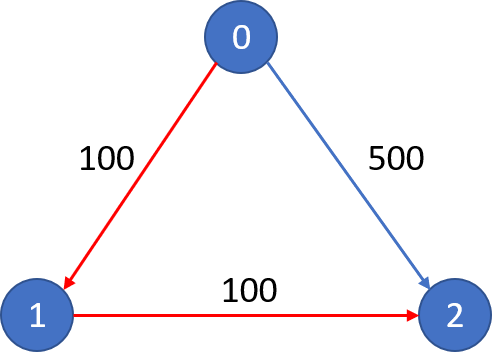public class Solution
extends Object
787 - Cheapest Flights Within K Stops\.
Medium
There are `n` cities connected by some number of flights. You are given an array `flights` where flights[i] = [fromi, toi, pricei] indicates that there is a flight from city fromi to city toi with cost pricei.
You are also given three integers `src`, `dst`, and `k`, return _**the cheapest price** from_ `src` _to_ `dst` _with at most_ `k` _stops._ If there is no such route, return `-1`.
**Example 1:**

**Input:** n = 3, flights = \[\[0,1,100],[1,2,100],[0,2,500]], src = 0, dst = 2, k = 1
**Output:** 200
**Explanation:**
The graph is shown.
The cheapest price from city `0` to city `2` with at most 1 stop costs 200, as marked red in the picture.
**Example 2:**

**Input:** n = 3, flights = \[\[0,1,100],[1,2,100],[0,2,500]], src = 0, dst = 2, k = 0
**Output:** 500
**Explanation:**
The graph is shown.
The cheapest price from city `0` to city `2` with at most 0 stop costs 500, as marked blue in the picture.
**Constraints:**
* `1 <= n <= 100`
* `0 <= flights.length <= (n * (n - 1) / 2)`
* `flights[i].length == 3`
* 0 <= fromi, toi < n
* fromi != toi
* 1 <= pricei <= 104
* There will not be any multiple flights between two cities.
* `0 <= src, dst, k < n`
* `src != dst`